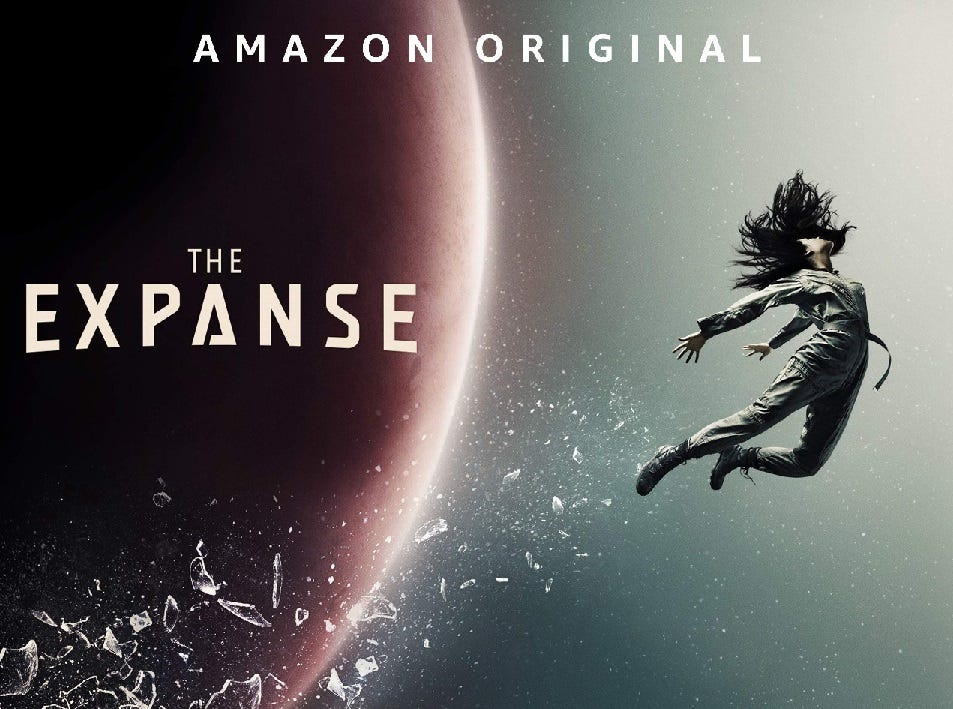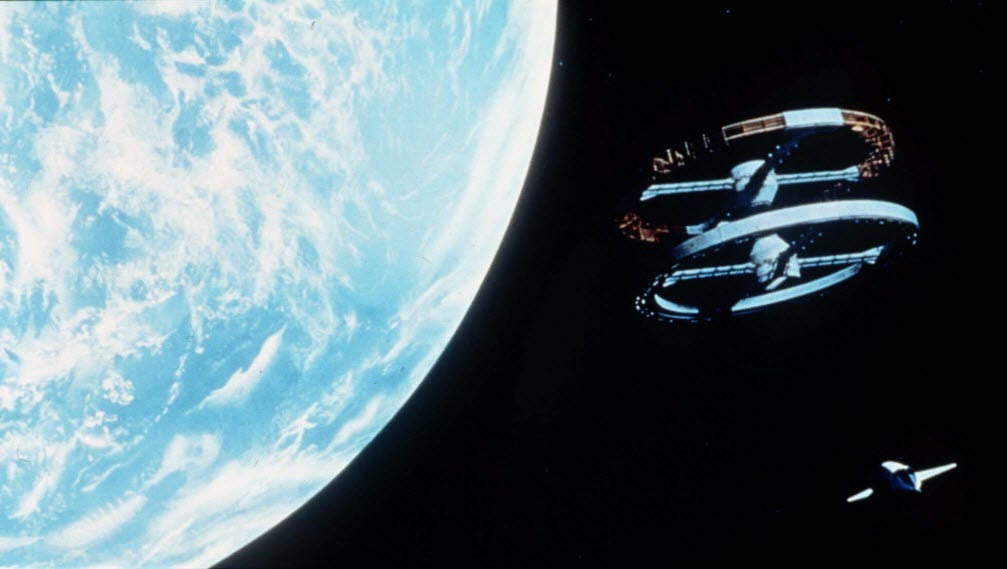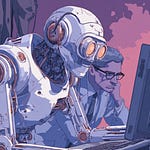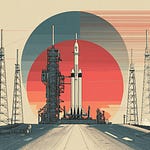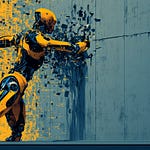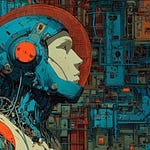On previous episodes of Faster, Please! — The Podcast and in my newsletter essays, I've argued for the importance of optimistic science fiction. But what exactly qualifies as future-optimistic fiction, and how is it different from utopian literature? To discuss one of my favorite science-fiction book and TV series, The Expanse, and to consider the importance of what fiction tells us about the future, I've brought on Peter Suderman.
Peter is features editor at Reason magazine. He has written a number of fantastic pieces on science fiction including "The Fractal, Fractious Politics of The Expanse" in the December 2022 issue of Reason.
In This Episode
Does The Expanse count as optimistic science fiction? (1:15)
Optimistic—not utopian—visions of the future (9:10)
The evolution of science fiction (19:30)
The importance of the future sci-fi shows us (27:09)
Below is an edited transcript of our conversation.
Does The Expanse count as optimistic science fiction?
French film director François Truffaut famously claimed it was impossible to make an anti-war film. He said, “I find that violence is very ambiguous in movies. For example, some films claim to be antiwar, but I don't think I've really seen an antiwar film. Every film about war ends up being pro-war.” And that quote, which has always stuck in my head, reemerged in my brain when I came across a somewhat similar observation from Jurassic Park author Michael Crichton, who said, “Futuristic science fiction tends to be pessimistic. If you imagine a future that’s wonderful, you don’t have a story.” I think some people may interpret that as meaning you cannot write optimistic science fiction.
And I think of a show that you have written a long essay about, and I've written about—not as intelligently, but I've written about it from time to time: the TV show The Expanse. And I find The Expanse to be optimistic sci-fi. It takes place in the future, a couple hundred years in the future. Humanity has spread out to Mars and the asteroid belts. There's certainly conflict. As an Expanse fan, someone just wrote an essay on it, would you agree that it’s optimistic science fiction?
I think it is, with some caveats. The first one is that it's optimistic but it's not utopian. And I think a lot of the argument against optimistic science fiction is actually not really arguing against optimism. It's arguing against utopianism and this idea that you sometimes see—there are hints of it sometimes in Star Trek, especially in Star Trek: The Next Generation—of, in the future humanity will have all of its problems solved, we won't have money, there will be no poverty. If you think about the Earth of Star Trek: The Next Generation's future, it's actually kind of boring, right? There isn't a lot of conflict. Writers eventually found ways to drive conflict out of conflicts between the Federation and other planets and even within the Federation. Because of course, they realized the utopian surface is just a surface. And if you dig down at all beneath it, of course humans would have conflict.
But I think a lot of the opposition to the idea of optimistic science fiction just comes from this idea of, “Well, wouldn't it be utopian?” And what The Expanse does is it tells a story that is, I think, inherently optimistic but really deeply not utopian, because it recognizes that progress is not an easy, straight linear line in which everybody comes together and holds hands, and there's a rainbow and My Little Ponies, and everybody just sort of sings, and it's wonderful. That's not how it works. In fact, the way that progress happens is that people have things they want in their lives, and then they seek, either on their own or in coalitions, factions, organizations—whether that's governments, whether that's the private sector, whether that's unions, whatever it is—they organize somehow or another to get the thing that they want. And sometimes they build things. Sometimes they build habitats.
And so this is something you see a lot of in The Expanse. Humans have colonized the solar system, as the story begins, and there are just all of these fascinating habitats that humans have built. Some of those habitats actually have problems with them. There are air filtration issues, where you have to constantly be supplying ice from asteroid mining. That sort of thing. Some of the main characters, when we first meet them, are working as ice haulers. Because of course, you would have to have some sort of trade of important resources in space in order to make these habitats work. And you could call this, “That’s not optimistic. In fact, a lot of these lives are sort of grubby and unpleasant, and people don't get everything they want.” But I think that misunderstands the idea of progress, because the idea of progress isn't that suddenly everything will be happy and My Little Pony-ish. It's not My Little Pony. It's actually conflict and it's clashing desires and it's clashing ideals about how humans should live. And then it's people kind of working that stuff out amongst themselves, day by day, hour by hour, through coalitions, through organizations, through institutions, through technology, through politics sometimes. And all of those sort of tools and all of those organizational forms have a role. Sometimes they also have drawbacks. All of them have drawbacks to some extent. And then it's just a matter of how are people going work out the problems they have at the moment in order to get to the next place, in order to build the thing they want to build, in order to start the society they want to have.
It's a six-season TV show based on a nine-novel series. The six-season TV show adapts the first six books, and then there are three additional books, plus there's a bunch of short stories, novellas, interstitial material. There's this moment that happens in both the TV show and in the books that's really important. And it's about it when humanity finds a way to other solar systems. There are 1300 gates that open up and they can sort of go out and colonize the rest of space. All of these colonies are settled, and each one of them takes on an idea and a culture and often technological capability. There's one of them that's really funny that you meet called Freehold. Frankly, it's a bunch of anarchist libertarian gun nuts who decide to basically ignore all the rules that the trade union that is managing a lot of the trade between the gates has put in place. And they are managing that trade for a good reason. Because if you mess with the gates, if you go through them the wrong way, it kills people, it kills ships, it destroys them. And so you have to go through in order, and you have to go through slowly, and it's this whole sort of process. In Freehold, they‘re a bunch of difficult, crazy anarchist-like libertarian gun nuts who don't want to play by the rules. And at first they're a problem. You can see why that would be a problem for the social organizational form that has come up in these books from managing the gates and making sure that they don't kill people. But later, when basically a super powerful high-tech imperial planet that has designs on controlling all of humanity and putting all of humanity under the thumb of basically one emperor who has plans to live forever—it's sort of this, become a kind of a god who is ruling over all of humanity and then basically turn all of humans into like a hive mind but for the good of humanity so that we'll survive—when you have that all-encompassing, super powerful collectivist impulse that is threatening human civilization, it turns out that the libertarian anarchist gun nuts at Freehold are actually pretty good friends to have. This series does a bunch of interesting work of noting that, yes, of course those people can be difficult at times, and they can present problems to social cohesion. At the same time, it's not bad to have them as allies when you are threatened by an authoritarian.
Optimistic—not utopian—visions of the future
You've nailed it. Well done. I view it as optimistic but not utopian—I think that's a key point—particularly compared to how the future is often portrayed. I think it's pretty optimistic because no zombies. We're still around. And the world looks like it's doing okay. Was there climate change? Sure. But New York is surrounded by barriers. Clearly there's been disruption, but we kept moving forward. Now we're this multi-planetary civilization, so it doesn't look like we're going to get killed by an asteroid anytime soon.
I think a big mistake that a lot of the pessimists about the future in politics and our culture generally, but in science fiction as well—a big mistake that they make is that they think only in terms of grand plans. They think in terms of mass systems of social control and social organization. And so when you see an apocalypse, it's “all the governments have failed and so has capitalism.” When you see an apocalypse, it's “the oceans swallowed us because we used too much energy or the wrong kind of energy.” And that's it. The grand plan didn't work. And then we're in a hellscape after that. And what you see in The Expanse, what makes it so smart, is grand plans actually do fail.
Almost any time somebody has a big sweeping theory of how we're going to reorganize human social organization, of how humanity is going to be totally different from now on—almost anytime that someone has that sort of theory in The Expanse series, it doesn't work out. And often that person is revealed to be a bad guy, or at least somebody who has a bad way of thinking about the world. Instead, progress comes in fits and starts, and it's made on a much smaller scale by these ad hoc coalitions of people who are constantly changing their coalitions. Sometimes you want something that requires building something, that requires a new technology. And so you ally with people who are engineer types, and you work with them to build something. At the end of it, you've got the thing that they've built, and your life is a little bit better, or at least you've accomplished one of your goals. And then maybe after that, those people, the engineers, actually it turns out that they have a culture that is not cooperative with yours. And so you're going to ally with a different political faction and the engineers are going to be on the other side of it, but they've still built the little thing that you needed them to build. And it's just this idea that big systems and big plans that assume that everything falls in line, those plans don't work, and they do fail. And if that's your idea of how we're going to make progress, that's a bad idea. The way we make progress is…
In a Hayekian sense, all our individual wants and needs cannot be incorporated in this grand system or grand plan. Our wants and needs today, much less how those will evolve over time. Our future wants and needs don't fit into the plan either.
Yeah, this is right. This is one of the issues I have with a lot of zombie fiction, is that it just sort of assumes that after the zombie apocalypse—the zombie apocalypse is not all that realistic, but you can imagine a scenario in which there is something environmental that really goes very bad for humanity; that's not out of the realm of possibility—but what a lot of the zombie apocalypse fiction assumes, then, is that in the decades or years afterwards no one will really find ways to work with other people towards shared goals. Or at best, they'll do so in a really ugly and simplistic way where somebody sets up a society that's walled off but it's ruled by some evil authoritarian and you're living under this person's thumb.
I grew up in Florida, and so we had hurricanes. One of the things you see when you have hurricanes is that, yes, there is a government response and they send out trucks and power company officials and all of that sort of thing. But people drive around the neighborhood with chainsaws and cut up the trees that have fallen across your driveway. And other people who may not have chainsaws go and help their friends move the stuff out of their bedroom where the tree fell into the bedroom through the ceiling and there's been some leakages. It's just sort of people working together in these informal coalitions, these little neighborhood local groups, to help each other out and to try to fix things that have broken and gone wrong. It’s not fun. It’s not like, “Oh man, hurricanes, they're wonderful. We shouldn't worry about them at all!” We should, and we should try to build resilience against them and that sort of thing.
At the same time, when disaster strikes, often what you see—not always, but often what you see—is that people come back together and they survey the problems and they work to fix them minute by minute, hour by hour in little ways. And sometimes the first thing you do is, “Well, I got a hole in my roof. I'm going to stretch garbage bags across it so that the next time it rains…” And then you got a hole in your roof with garbage bags across it for a couple of weeks. But that's a solution for the time. It's better than a hole in your roof. On the other hand, you got a hole in your roof. It sucks. But that's progress relative to the hole that's there. That’s a way that a lot of people who don't think about engineering, who don't think in a Hayekian manner, it's something that they miss. Because they only think about big systems and big plans. And big systems and big plans do have big risks, and they do often fail. But that's not how humans figure out how to move forward and how to make their life better.
An interesting aspect is that, you mentioned how at some point these gates open so we're no longer stuck in the solar system. We can go to any of these other planetary systems. And what's interesting is the devastating effect this has on the planet Mars, which is its own world, its own government, it has its own military, it's independent of Earth. But it's a society that was built around one big idea, which is terraforming Mars and creating a sustainable civilization. And when that goal didn't look important anymore, that was it. It fell apart. People left. There was no resilience, there was no ability to adapt. To me, that's one of the most interesting twists I've seen in science fiction. When the grand plan fails, the whole thing falls apart because they never assumed the grand plan wouldn't work.
The Mars example is great because it shows what I think is one of the biggest problems in political thinking and in kind of bad science-fiction storytelling. It's a great demonstration of steady state thinking, where people think that the current arrangement of power and resources is going to persist forever. And so Mars in The Expanse story was basically a competitor with Earth, which in The Expanse universe was the sort of political home of humanity as well as the bread basket. It's where of all the food was produced. And then the asteroid belt, which is sort of the rough and tumble outer world—the outer world were the resource extractors. They provided for the inner systems. They kind of had a blue-collar vibe to them. There was some terrorist activity that came out of this because they were resentful. There's sort of some interesting cultural and subcultural effects there. And then Mars was heavily military and high tech, and they thought that would be their competitive advantage.
Almost a quasi-fascist state, in a way. It was very militaristic and authoritarian.
Yes, which comes back to pay off in a big way in the final three books of the trilogy which, unfortunately, the shows don't adapt, but are in some ways, I think, the best of the books. And so much of our politics is built around that idea that this power structure, this arrangement of resources that we have right now where everybody's on Facebook, where everybody is on Twitter, where everybody uses Google search, that's going to last forever. And the only way you can dislodge it is through government and through regulation and through interventions that are designed to break that sort of thing up. I'm thinking very specifically of antitrust, and a lot of antitrust theories are predicated on this. But there are other realms in which this sort of approach to regulation and to politics is quite common as well.
And in The Expanse, you see, guess what? Those power structures—even power structures that have persisted in the case of The Expanse books at least for decades and I think for a couple of hundred years that's basically been the arrangement as we sort of enter the story—even those arrangements that seem like they're immutable facts of human organization—Oh, this is how politics has always been; this is how the arrangement of national power (effectively in this story) has always been arranged—those things can change, and they can change because of environmental changes and they can change because of technological developments that people don't foresee.
The evolution of science fiction
It seems to me that you had this period during the Space Race, the Atomic Age, ‘50s, ‘60s, in which there was lots of somewhat optimistic science fiction. You obviously had Star Trek and even I would say 2001: A Space Odyssey. You could go to the Jetsons, but then you started not seeing that. And to me, it seems like there's a pretty sharp dividing line there in the late ‘60s, early ‘70s, and I've written about that. Am I making too much out of that, that there was a change? Or has it always been like this and we started noticing it more because we started doing more science fiction?
I don't think you're wrong to notice that. And I think there was a big change in the 1970s. I think maybe one place to start, if you're thinking about that, though, is actually something like 100 years before the 1970s.
That would be the 1870s!
Yeah. In the 1870s, in the 1890s, maybe even a little bit before then. This maybe tells you how naive I was as a seven- or an eight-year-old, but I started reading science fiction when I was around eight years old. My parents were big fans, and I of course watched Star Trek even starting when I was four or five. Star Wars, that sort of thing. I grew up in a real nerd household, and something that I heard when I was I believe in fourth grade that just blew my mind—but of course, it is super obvious when you hear it—is for a long time in human history, we didn't have science fiction. We didn't have it at all. And you go back to the 1700s, to the 1800s, you start to see little bits of it. Jules Verne, even maybe some of Edgar Allan Poe. But it wasn't until the Industrial Revolution and then some of the fiction that sort of came out decades into the Industrial Revolution. It wasn't until relatively recently in human history that people had the idea that the future would be different, because that's the heart of what science fiction is. It is the idea that the future will be different because humans will organize themselves differently, and/or because we will have invented new technologies that make our lives different.
And you go back to 1000 AD or 1200 or 1500 even, and you just don't see that idea present in fiction and in storytelling because essentially no one imagined that the future would be different. They thought it would be the way it was in their time forever. And they assumed that it had basically been the same forever. That humanity’s social and technological and resource arrangements would be steady state. And something happened in the ‘30s and ‘40s with the early science fiction that really predicated on this idea that, “Oh, wait! The future will be different and it will be better.” And then you get to the 1970s and things start to look a little bit shaky in world affairs, especially in the Western world, right? And what happens is that then is reflected in a lot of popular science fiction, where you start to see this more pessimistic view, this idea that the future will be different but it will be worse. And it will be worse because all of the things we rely on for the present will fail. I don't think that that's an illegitimate mode of storytelling in any way. I, in fact, really like a lot of…
Even as I've harangued against them, those are all super enjoyable movies. I just wish there were the other kind too. And it seems to me that maybe we're starting to get more of the other kind again. I mean, we don't have a lot of examples.
So about 10 or 15 years ago, there was literally a movement in science fiction led by people like Neal Stephenson, the author of most prominently Cryptonomicon, The Diamond Age, and Snow Crash in the 1990s, but also some more recent stuff as well. And he was like, “We need ideas about the future that are, if not utopian, then at least sort of optimistic. Ideas about things that we will do that will be better, not things that we will do that will make everything worse and that will sort of contribute to suffering and to collapse.” And Stevenson has been a leading proponent both of other writers doing that but then of doing it himself.
Since we were talking about ad hoc coalitions and small-scale problem solving, his novel Termination Shock, I think from two years ago, is a quasi-science-fiction novel about global warming set in the near future in which global warming has both become a real problem and also one that people have started to find a lot of small-scale ways to, not solve exactly, but to address on a personal level. When the novel begins, there are a lot of houses on stilts in Texas because there are flooding issues. But what, they just picked up their houses and they put them on stilts. And people have to wear these sort of Dune-like suits that cool them. There are all these sort of crazy traveling caravans of people who live not in any particular place, but then there are these mega truck stops that have sprung up to meet their needs and sort of become these kind of travel hubs. And then, of course, people start trying to not solve global warming, exactly, but to mitigate global warming kind of locally by shooting stuff into the air that blocks reflections of the atmosphere. Of course, that causes some problems. He's not just sort of like, “Yeah, we can just fix this.” But he's like, “This sort of thing is how problems get solve solved. They don’t get solved through politics and grand, multi-lateral agreements.”
Of course, I would also point to another Stephenson novel, which is Seveneves, which is a novel in which things get about as dark for humanity as possible. We're down to seven people, and then we come all the way back and beyond.
And it's all through distributed solutions. There’s a great bit: You get down to the final seven people and then you flash forward, I think it's like 5,000 years. There's just a great like section header in this book. You're like 700 pages into a 1000-page book and suddenly it just says, “5,000 years later.” Okay, okay, I guess. Sure, Neal Stephenson, you can do that. 5,000 years later. And you see that humanity is flourishing again because somehow or another you have distributed rings, habitat systems around the Earth. You have the submarine people. We don't really know what they did, but the submarine people somehow or another figured it out. There are still some Earth-dwellers who survived in caves, like probably the Mars people who just like took off for Mars in the middle of the catastrophe. We think they survived somehow too. Part of this is, there's a kind of cheat in that book in which he doesn't tell you how all of these people survived, but there's also a kind of genius and a truth in that, in that we don't know how it's going to go. But what we know is that when put to the test, people have—not always, I don't want to say it just works 100 percent of the time, because sometimes there are true catastrophes in the world—but people, when put to the test, when your survival, the survival of you, your family, your friends, and the future of your race is on the line, people have figured out ways to survive that their predecessors would never have imagined because they never had to.
The importance of the future sci-fi shows us
Is it important that we have popular culture that gives us images of the future, a variety of images, to shoot for?
I think it's incredibly important. I think even people who think it's important underrate how important it is. Because most people, even the smartest, most innovative people, they're… People are modelers. They kind of do things that they've seen done, even if it's that they've seen it in a story. And I just think about my own history and my own life. I grew up in a household where there wasn't, I would say, a lot of political ideology. It was in the background, but my parents like didn't actually talk about politics that much. It was just that one of them was quite liberal and the other one was quite conservative. And there were differing radio programs that I would hear in the company of one versus the other.
But they were both, like I said, science fiction readers. And there was science fiction just all over our house. The first adult science-fiction novel I read was The Caves of Steel, which I was given when I was in fourth grade, eight-years-old. It’s like Isaac Asimov's sort of Agatha Christie murder-mystery-in-the-future, in a futuristic New York, story. I was totally hooked after that. I just didn't ever go back. Read science fiction. And like I said, what science fiction gave me was this idea that the future would be different and that maybe—maybe—it could be better in some ways. And I think that if you just listen to interviews and talk to the people who are at the head of some of the most innovative companies in the world and in the United States right now, one through-line you see is that maybe not all of them, but a surprising number of them were science fiction readers growing up as kids.
And they spent a lot of time, as a result, just sort of imagining the future. And imagining that it would be different. And I think that exercise, just being drawn into that kind of imagination of a world that is different than the one we live in now and different because people have invented things, because people have reorganized politics, because of whatever it is, but a world that is different because the future will be different—that is an exercise that we need more people to engage in. And when people do it, I think the results… I frankly think that even reading pessimistic science fiction is better than reading none at all, because again, it just constantly hammers home this idea [that] the future will be different. It's not a steady state. That progress or maybe anti-progress can be made.
I think it certainly matters on that sort of doer, elite level, where you do have all these entrepreneurs, Silicon Valley folks, who obviously were really inspired by science fiction. Also, I think it's just important for everybody else. I just can't imagine, if people have gotten more of that, not only would they be a bit more resilient to the super negativity. It would just create more dreamers among people about what the future can be. Not utopia, but better. I'll take better.
I'll take better as well. And I think that storytellers have a big role to play in that. And I think that anybody who creates images, who is an imaginer for the popular consciousness, has some influence here. Because like I said, people call to mind what they have seen before and people operate based on the ideas that have been handed to them. I certainly would like to see more of those stories. And I would also just like to say that if you're a person who tells stories and who makes images and who tries to sort of worm your way into the public consciousness, obviously you can do it through fear. But wouldn't it be better, wouldn't you feel a little more proud of yourself if you could do it through hope and through making people think that maybe there's something wonderful coming?
Star Trek and Star Wars, which is the capitalist show, which is the communist show?
Star Trek: The Next Generation's pilot episode is about how basically energy capitalism is inherently bad. The Ferengi are the super capitalists. It's really hard to make like a strong “Star Trek is a pro-capitalist show” argument. Maybe. You get a little bit into that with some of the Deep Space Nine stuff later. But even there, that's mostly just about political conflict. Does that mean that Star Wars is the pro-capitalist show? I don't know. I mean, people do seem to have jobs and buy and sell stuff and make things. I guess I’d have to go with Star Wars just because you can buy droids when you need help on your farm? That’s all I got.



